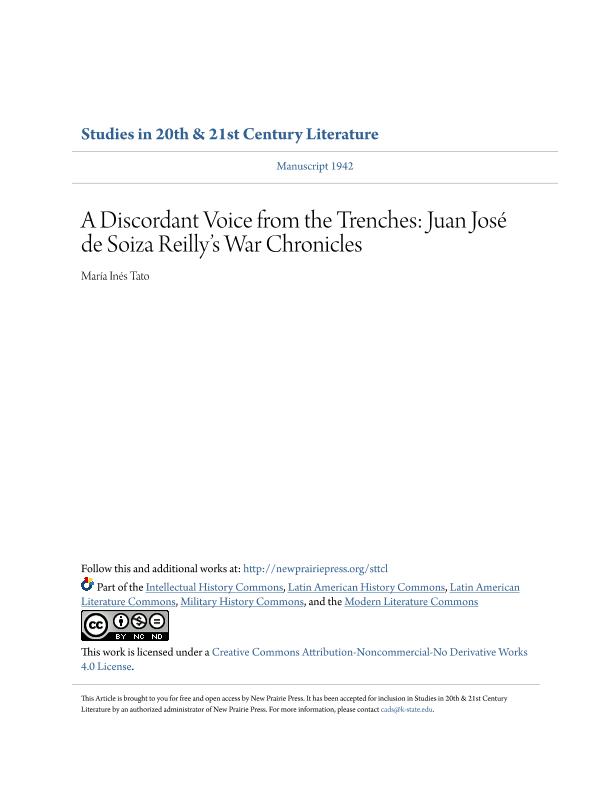Artículo
A Discordant Voice from the Trenches: Juan José de Soiza Reilly's War Chronicles
Fecha de publicación:
06/2017
Editorial:
Kansas State University Department of Modern Languages; New Prairie Press
Revista:
Studies in 20th & 21st Century Literature
ISSN:
0145-7888
Idioma:
Inglés
Tipo de recurso:
Artículo publicado
Clasificación temática:
Resumen
The First World War represented a deep crisis of the European civilization that called into question the values and certitudes of the Belle Époque society. Trenches became the symbol of the dehumanization produced by a conflict that marked a watershed in modern history. As a global conflict, its impact was felt beyond the confines of Europe, involving even neutral countries, puzzled by that unexpected spectacle of violence. In this new scenery, war correspondents were first-hand witnesses of the horrors of the battlefields, transmitted through their journalistic contributions to a public opinion profoundly shaken by this new kind of warfare. Non-European war correspondents were exceptional cultural mediators between the experiences of the theater of war and distant regions like Latin America, contributing to disseminate different understandings of the wartime crisis. This article aims to explore the response of the Argentine war correspondent Juan José de Soiza Reilly (1879-1959) to the challenge of making the nature of the Great War intelligible to his readers. He embodied the new figure of the professional journalist-writer who contributed to establishing commercial mass press as the fulcrum of Argentine cultural life and as the field of convergence of literature and journalism at the beginning of the twentieth century. The primary sources of this study are Soiza Reilly’s war chronicles, published by two large circulation periodicals, the newspaper La Nación and the illustrated magazine Fray Mocho, from October 1914 to October 1916. Those contributions were the result of his more than two years’ experience in the Western and Eastern fronts. Soiza Reilly’s perspectives on the First World War were clearly unconventional for his national framework, where most of the intellectuals and the press took sides early in favor of the Allies, due to the deep-rooted Francophilia prevailing in Argentine cultural field. As a result, they devoted themselves to arguing over the question of the war responsibilities and the belligerents’ attributes. Unlike them, Soiza Reilly denounced the absurdity of the war, which he strongly condemned, and made a pacifist profession of faith. In addition, far from the Argentine social consensus, he was often critical of the Allies and sympathetic to the German Empire. However, since Italy’s entry into the war in May 1915, Soiza Reilly adopted a belligerent attitude in favor of the Allies, expressing an intense admiration for Italy and a virulent anti-Austrian sentiment. These two last features were very unusual in the Argentine context, where the devotion for France was hegemonic as well as the vehement anti-German stance. Through the analysis of Soiza Reilly’s war chronicles and reportages, this article intends to shed light on the reception of the war in a neutral country, the general climate of public opinion, and its dissensions around the significance of the Great War.
Palabras clave:
First World War
,
War Correspondents
,
Argentina
,
Juan José de Soiza Reilly
Archivos asociados
Licencia
Identificadores
Colecciones
Articulos(INSTITUTO "DR. E.RAVIGNANI")
Articulos de INST. DE HISTORIA ARGENTINA Y AMERICANA "DR. EMILIO RAVIGNANI"
Articulos de INST. DE HISTORIA ARGENTINA Y AMERICANA "DR. EMILIO RAVIGNANI"
Citación
Tato, María Inés; A Discordant Voice from the Trenches: Juan José de Soiza Reilly's War Chronicles; Kansas State University Department of Modern Languages; New Prairie Press; Studies in 20th & 21st Century Literature; 41; 2; 6-2017; 1-17
Compartir
Altmétricas




